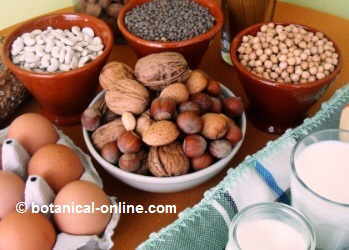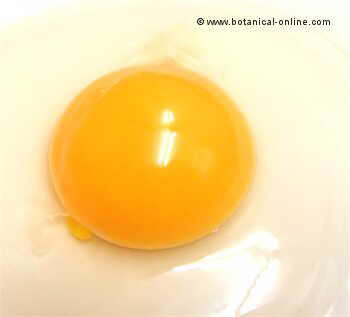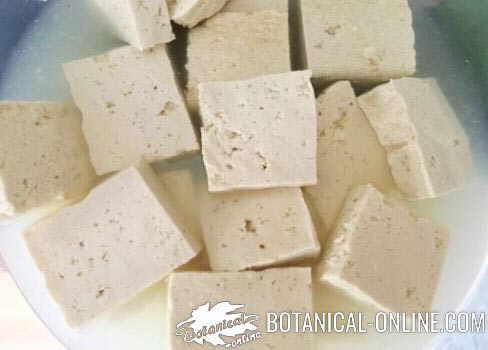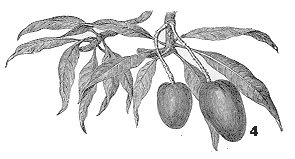Contents
Benefits and functions of lysine, essential amino acid
What is lysine?
Lysine is an essential amino acid that the body can not synthesize and therefore must be provided by the diet. The abbreviation for this amino acid is Lys.
Functions of lysine
Lysine is very important and necessary in many aspects:
- It is responsible for maintaining a good state of our connective tissues, being essential for the formation of collagen. In the body, we can find in high concentrations part of the musculature.
- It is necessary for the production of hormones, enzymes and antibodies.
- It is also necessary to synthesize carnitine, with the help of methionine.
Properties of lysine
 Photo of foods rich in protein from a vegetarian diet. Nuts and cereals are deficient in the amino acid lysine, and should be combined with other protein sources (cereal, dairy, eggs,…) to take this amino acid and for the body to properly take advantage of its proteins.
Photo of foods rich in protein from a vegetarian diet. Nuts and cereals are deficient in the amino acid lysine, and should be combined with other protein sources (cereal, dairy, eggs,…) to take this amino acid and for the body to properly take advantage of its proteins.
- Because of its role in the absorption and good distribution of calcium, lysine is very suitable in preventing osteoporosis and rickets.
- As part of collagen, lysine must be very present in the diet of people with skin problems, ligaments, bones, or in general, any impairment that requires tissue regeneration. This amino acid is very suitable for greater recovery in case of breaks, sprains, dislocations, muscle tears, etc. It also helps to improve the symptoms of osteoarthritis.
- Other skin anomalies are enhanced with the use of this amino acid as wounds, burns, sunburn or acne.
- Lysine ensures the formation of our defenses, increasing immunity, keeping our body antibodies and preventing the occurrence of infections. For both reasons it is used to alleviate the symptoms of herpes virus.
- Lysine is necessary for proper growth especially in early ages, since it is very important in the absorption of calcium and in stimulating growth hormone. Lysine is involved in the formation of hormones such as GH (growth hormone), and therefore ensuring proper development and growth of our body, and it is also involved in the absorption of calcium, triglycerides and nitrogen.
- Lysine helps thin the blood by acting, together with vitamin C, in preventing the formation of blood clots that lead to the development of atherosclerosis.
- Lysine has an antioxidant role in contributing to cell repair caused by free radicals. Its importance in preventing lack of vision due to diabetic retinopathy or its role in cellular aging delay is very prominent. Equally important it seems to be their contribution to preventing the development of cancer cells.
- Lysine helps digest food better so useful in the treatment of certain gastric anomalies as gastritis, flatulence, indigestion, gastric ulcers or constipation.
- Lysine helps in better fat metabolism, making it suitable for lowering cholesterol and triglycerides.
Contraindications of lysine
- Pregnant women or people suffering from liver and kidney: They should not take supplements of isoleucine.
- People with liver disease, kidney disease or impaired in nitrogen metabolism should not take supplements of isoleucine or other amino acid.
Lysine: limiting amino acid in cereals and nuts
Lysine is a limiting amino acid in cereals and nuts. That is, the grains of the family gramineae provide very little protein with the amino acid lysine, insufficient for the organism. This causes the protein not to be properly exploited.
People who follow a vegetarian diet may have heard about the importance of combining plant proteins for producing good quality protein.
All grains and nuts are deficient in the amino acid lysine, An optimal nutrition requires the combining of these food proteins with other proteins rich in methionine.
This combination is possible with pulses, which are abundant in lysine (but deficient in methionine). It is also compensable by combining grains or nuts with milk or eggs.
| Food | Limiting amino acid | |
| Methionine | Lysine | |
| Chickpeas | ||
| Nuts | ||
| Rice | ||
| Chickpea stew with rice | ||
Foods containing lysine
Animal foods are those that contain more lysine, especially cheese and protein supplements made from milk powder (whey protein)
Within plant foods, we include, for example, wheat germ
* More information: Foods rich in lysine
Lysine supplements
Although you can take lysine supplements, it is recommended to meet the needs of this amino acid through a balanced diet. If supplementation is necessary, consult with the specialist before taking it.
- Lysine supplements are known under the name LLysine (“L” corresponds to the chemical structure of the molecule).
- They come in tablets of 500 . 600 mg, which are taken from 1 to 3 tablets a day, on an empty stomach.
- They are also used in the composition of many sports supplements, given their properties for the formation of collagen and muscle.
* Related information:
– How to combine vegetable proteins
List of amino acids in food | |
Essential amino acids | Nonessential amino acids |
Phenylalanine, Isoleucine, Leucine, Lysine, Methionine, Threonine, Tryptophan, Valine | Aspartic acid, Glutaminic acid, Alanine, Arginine, Cysteine, Cystine, Glycine, Hydroxyproline, Proline, Serine, Tyrosine |
![]() More information on amino acids.
More information on amino acids.








